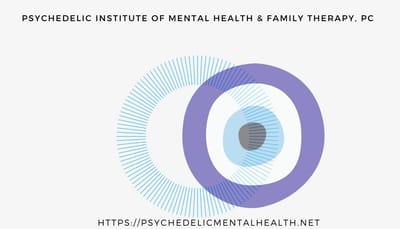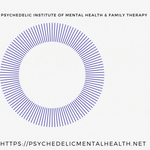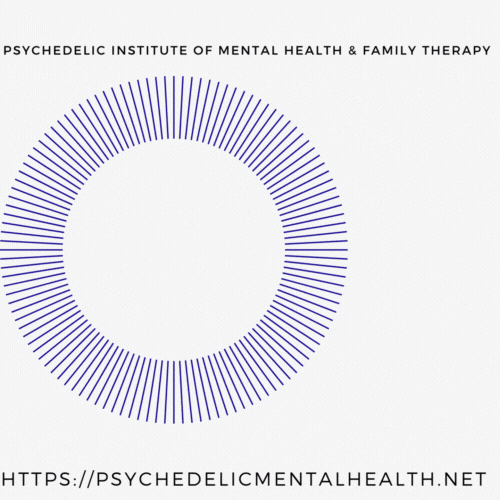Spotlight: The Magic Church
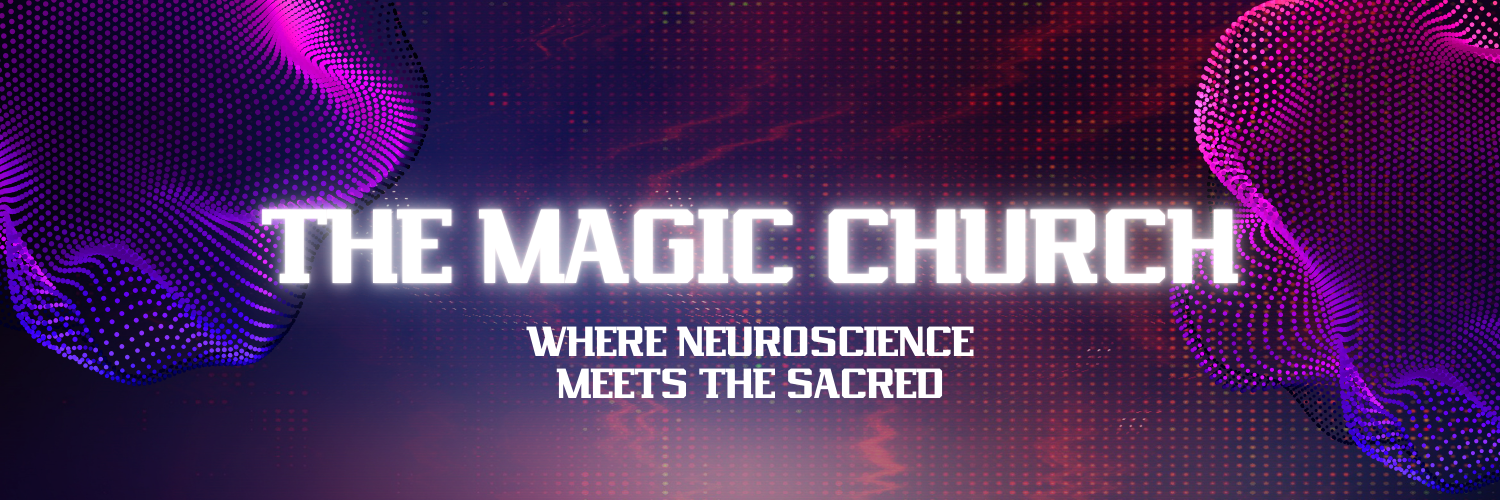
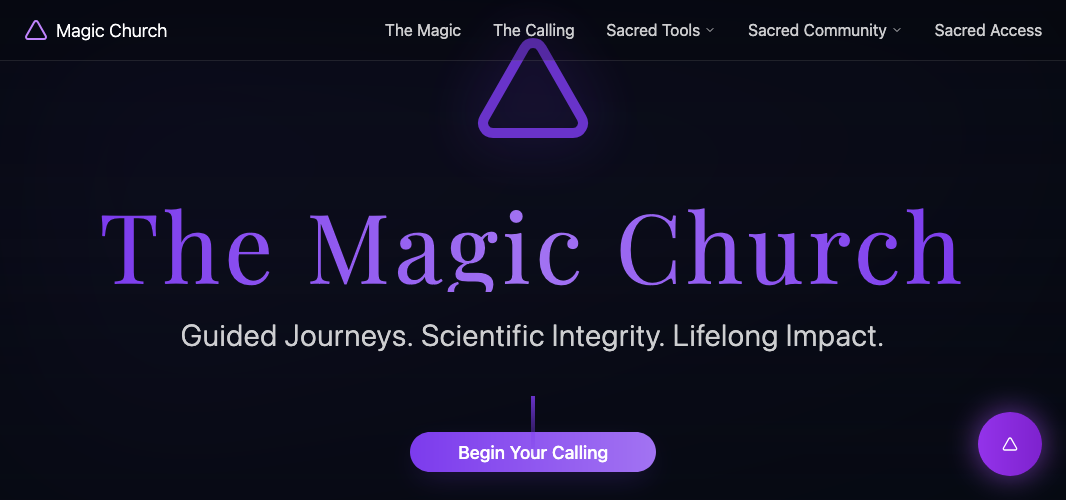



Natalya Gevorgyan is the Founder of The Magic Church, a nonprofit exploring the intersection of science, spirituality, and sacred practice in the study of psilocybin. With an MBA from Nankai University in China and a background spanning IT, hospitality, and investment banking across Armenia, India, and China, she brings a disciplined, research-informed approach to spiritual leadership. After her own transformative experiences with psychedelics, she founded The Magic Church as a sanctuary for intentional growth, bridging neuroscience, psychology, and spiritual care within a framework of integrity and reverence.
Natalya was kind enough to take some time to answer some questions about her project.
What led you to work with psychedelics, and form this new church?
I didn’t come to psychedelics as a professional, I came as a seeker. What began as curiosity became a process of profound healing. My own experiences revealed something I had long sensed: that the deepest forms of healing aren’t just cognitive or chemical, but existential. They reconnect us with the truth of who we are. Through psilocybin, I experienced what I can only describe as a return to wholeness, a direct understanding that emotional suffering is not a flaw, but a signal calling us back to balance. This experience, combined with years of study and observation, inspired me to create The Magic Church, a sacred and compliant space where science and spirituality coexist. The word church represents belonging, a sanctuary where transformation is honored rather than pathologized. We are not a clinical institution, but a faith-based organization dedicated to intentional, evidence-informed spiritual practice. My purpose is to help others safely explore what I discovered: that healing is not about escaping pain, but transforming our relationship to it. That’s the foundation of The Magic Church, a bridge between disciplined science, sincere spirituality, and the human need for meaning.
How does your clinical or research background influence your work within the church setting?
Our approach is guided by sincerity and informed by science. Though our setting is spiritual, our structure is grounded in evidence-based principles from psychology, neuroscience, and trauma research. Our growing team includes individuals trained in psychology, psychotherapy, and consciousness studies, as well as those with years of experience in integration work, contemplative practice, and spiritual care.
This blend of science and lived wisdom ensures that every step, from preparation to integration, honors both the human nervous system and the human spirit.
We treat psilocybin as a sacrament, yet our protocols reflect the same care and rigor as research settings. Informed consent, safety, and emotional readiness guide all we do.
Science gives us structure.
Spirituality gives us meaning.
Together, they form a bridge between neuroscience and the soul.
What ethical principles guide your offerings?
At The Magic Church, ethics are the foundation of everything we do. We believe that sacred work with psilocybin requires humility, responsibility, and respect for both science and spirit.
Our ethical framework is guided by five core principles:
Informed Consent and Autonomy – Every member engages voluntarily, with full understanding of the process, purpose, and potential outcomes. There is no persuasion or promise, only education, reflection, and choice.
Safety and Integrity – All ceremonial and preparatory practices are designed to prioritize emotional, psychological, and physical safety. Facilitators are trained in trauma sensitivity, non-directive support, and crisis response.
Confidentiality and Trust – We protect the privacy of every member. Personal experiences, data, and communications are treated as sacred and confidential.
Non-Commercialization and Purity of Intention – We are a nonprofit spiritual organization, not a commercial retreat or wellness brand. Our work is rooted in sincerity, not profit.
Integration and Aftercare – The journey does not end with the ceremony. Ethical facilitation requires continued care, reflection, and support to ensure insights become lasting transformation.
We hold deep reverence for the human psyche and for the sacred intelligence of psilocybin. Ethics, to us, are not just guidelines, they are a living practice of integrity, compassion, and respect.
How does your organization honor indigenous traditions without appropriating them?
We have a deep respect for the Indigenous cultures that have carried this sacred knowledge for centuries.
We do not try to copy or recreate their rituals. Instead, we honor their wisdom by acknowledging the origins of psilocybin and the cultures that have worked with it in sacred ways.
Our approach is contemporary and unique to our community. It blends spiritual intention with modern understanding from psychology and neuroscience. Before every ceremony, we offer gratitude to the land, the ancestors, and the traditions that have protected this medicine.
We also practice reciprocity through education and by supporting Indigenous-led initiatives that keep their voices at the center.
For us, honoring means remembering where this all began, and ensuring that what we do today is rooted in respect, responsibility, and truth.
How do you practice reciprocity with the cultures and communities that have preserved these medicines?
Reciprocity means giving back with awareness, humility, and gratitude.
We recognize that psilocybin and other sacred medicines carry lineages that predate us by thousands of years, and that many Indigenous communities have risked persecution to keep this wisdom alive.
Our way of practicing reciprocity begins with acknowledgment and extends into action. We educate our members about the origins of these sacred traditions and the people who have carried them forward. In all of our teachings and written materials, we clearly state that these medicines did not begin with us.
We also aim to support Indigenous-led organizations and conservation efforts that protect sacred plant species, ancestral lands, and cultural heritage. When possible, we collaborate or donate to groups engaged in education, reforestation, or traditional ecological knowledge projects.
Reciprocity for us is also spiritual, the practice of humility and awareness that every ceremony, teaching, or healing space we offer exists because others preserved the wisdom that made it possible.
We view this work not as borrowing, but as carrying forward — with gratitude, reverence, and responsibility.
What does preparation and integration look like in your model, and how is it different from clinical approaches?
Preparation and integration are sacred processes; they form the foundation of every journey. Our model combines spiritual care, psychological insight, and ritual intention to support both safety and transformation.
Preparation begins long before ceremony. Members spend time reflecting on their intentions, emotional readiness, and personal boundaries. We guide them through journaling, breathwork, and grounding exercises designed to quiet the mind and clarify the purpose of the journey. Unlike purely clinical models, our preparation also includes spiritual reflection and symbolic understanding of the sacred — inviting seekers to approach the experience with reverence rather than performance or experimentation.
Integration is equally essential. We see it not as an afterthought, but as the true beginning of transformation. In the weeks following the ceremony, members engage in guided reflection, group sharing, or one-on-one integration sessions. The focus is on translating insight into daily life, strengthening relationships, redefining values, and making lasting behavioral shifts.
Where clinical approaches often frame the process as therapy or treatment, we view it as spiritual education. The goal is not only symptom reduction but a deeper relationship with the self and the divine.
Our integration model blends modern neuroscience with contemplative traditions, offering a bridge between psychological healing and spiritual awakening.
What safeguards are in place to protect participants and ensure ethical facilitation in your work?
Safety and ethics are at the center of everything we do. We believe that sacred work requires clear structure, trained facilitation, and transparent boundaries.
Every member begins with a thorough intake and readiness process, designed to assess emotional stability, intention, and suitability for the experience. We do not accept individuals in crisis, with untreated psychiatric conditions, or without adequate preparation. This ensures that every journey occurs from a place of grounding and informed consent.
Our facilitators are trained in trauma-informed care, spiritual ethics, and crisis management. They undergo continuous education in psychological first aid, consent protocols, and sacred space stewardship. Each ceremony is supported by at least one lead guide and one assistant, ensuring that no member is ever left unattended.
We follow strict set and setting protocols: small group sizes, serene and controlled environments, and non-invasive supervision. There is no coercion, no touch without consent, and no use of suggestive influence. Every element is designed to respect autonomy, dignity, and personal space.
Integration support is mandatory. Members have post-ceremony check-ins and are encouraged to seek ongoing reflection or mentorship as needed.
Our ethical framework is guided by three pillars: non-harm, informed choice, and reverence for the sacred.
We are not a therapy clinic, and we make that distinction clear. What we offer is spiritual support grounded in ethical integrity, compassion, and safety.
Where do you see psychedelic-assisted psychotherapy fitting into your overall model? What do you think is important for mental health practitioners to know about your offerings?
We deeply respect the field of psychedelic-assisted psychotherapy. Clinical research has shown incredible results for people struggling with depression, trauma, and anxiety.
Our model is different, but complementary. We don’t provide therapy or diagnosis — we offer psilocybin as a sacrament within a spiritual and intentional framework. The goal is not just healing symptoms, but awakening meaning and connection to the divine.
We’re informed by science. We study the same research that guides the clinical world, from institutions like Johns Hopkins and Yale, and apply those safety and preparation principles in a spiritual context.
For mental health practitioners, it’s important to know that we operate with the same care and ethics, but from a place of reverence. We see our work and clinical therapy as partners in the same mission: helping people remember who they are and live with more peace, purpose, and freedom.
What do you think it's important for people with religious trauma to know about your group who may be concerned about group-think, guru mentality, or who see "psychedelic church" and think cult?
We understand that many people come to this path carrying deep wounds from organized religion, spiritual abuse, or systems of control disguised as faith. Our mission is to offer a space of healing, not hierarchy, a place where spirituality is experienced through personal connection, not imposed belief.
We do not ask anyone to adopt dogma, surrender authority, or follow a guru. The central teaching of The Magic Church is that the divine lives within each person. Every ceremony, reflection, and dialogue is designed to help individuals access their own inner wisdom, not replace it with someone else’s truth.
Our structure is transparent and collaborative. There is no single figure of spiritual authority, and all facilitators are trained in ethical, non-coercive guidance. Members retain full autonomy over their choices, experiences, and interpretations.
We address religious trauma with compassion and psychological understanding. Many of our seekers come from backgrounds where faith was used to control or shame. Here, faith is reframed as freedom, the ability to reconnect with your Higher Self in an environment of acceptance and respect.
The word church for us means community, a sacred space for remembrance and transformation, not doctrine or hierarchy. For anyone who is hesitant, we encourage dialogue. Ask questions, read our materials, or observe before joining. We are not here to convince; we are here to hold space for healing.
Who facilitates the church ceremonies? How are they vetted? With what medicine approaches do they work?
Our ceremonies are facilitated by a small, highly trained group of guides and spiritual attendants who operate under a strict code of ethics, safety, and integrity.
Each facilitator is carefully vetted through a multi-step process that includes background checks, psychological evaluations, and interviews assessing emotional maturity, trauma awareness, and motivation for serving. We do not accept facilitators who seek authority, influence, or personal gain. The primary quality we look for is humility, the ability to hold space without projection or control.
Our facilitators come from diverse professional and educational backgrounds, including psychology, neuroscience, somatic therapy, meditation instruction, and chaplaincy. Many have undergone formal psychedelic training programs and have participated in multiple years of supervised ceremonial practice.
They are trained in trauma-informed care, non-directive guidance, and ethical facilitation. Before being approved to lead, they complete a mentorship period assisting senior facilitators in real ceremonies to ensure competency and presence.
We work primarily with psilocybin, approached as a sacred sacrament, not a recreational substance. Every ceremony takes place in a controlled and intentional environment that emphasizes reverence, preparation, and safety.
Our facilitators are not “healers” in the traditional sense, they are guardians of space. Their role is to help members feel safe, supported, and connected to their own healing intelligence.
We maintain transparency in our structure, documentation of facilitator qualifications, and a clear grievance process to ensure accountability at every level. Our guiding principle: the facilitator never leads the journey; the seeker’s own spirit does.
Is your group welcoming of LGBTQ people? Would you describe your group of tolerant of queer people? Affirming? Ambivalent?
At The Magic Church, every individual is welcome, fully, equally, and without condition.
We believe that the journey toward higher awareness belongs to everyone, regardless of gender identity, sexual orientation, or background. Our community includes people from many paths, and we celebrate that diversity as part of the sacred fabric of human experience.
We are not simply tolerant, we are affirming.
What unites us is not identity, but intention: the shared pursuit of healing, truth, and inner connection.
Our core principle is that spiritual freedom means personal authenticity.
The path to the divine begins with self-acceptance, and our role is to support that discovery for everyone who walks through our doors.
And lastly - the TLDR takeaway - what's the most important thing you want people interested in visionary medicine work to know about your group?
If there’s one thing I’d want people to know about The Magic Church, it’s that we exist to bring integrity, science, and spirituality back into the same conversation, especially in the world of visionary medicine. We are not here to promote a trend or promise instant enlightenment. We are here to protect the sacred, to create a place where psilocybin can be approached with safety, intention, and reverence, guided by both evidence and spirit. So much of modern culture has forgotten what it means to sit with silence, to meet oneself, or to see healing as a sacred act. The Magic Church is a home for those who want to rediscover that, for seekers who want to heal deeply, not just symptomatically. Our community welcomes entrepreneurs, scientists, therapists, artists, anyone ready to look inward with courage. Whether you call it God, the Higher Self, or consciousness, our mission is to help you reconnect to that truth within you. We honor the research, we honor the mystery, and we hold both with the same care. Because at the heart of it, this is not about mushrooms, it’s about remembering who you are and what it feels like to live with meaning again.

Follow The Magic Church on Mastodon in the Fediverse
